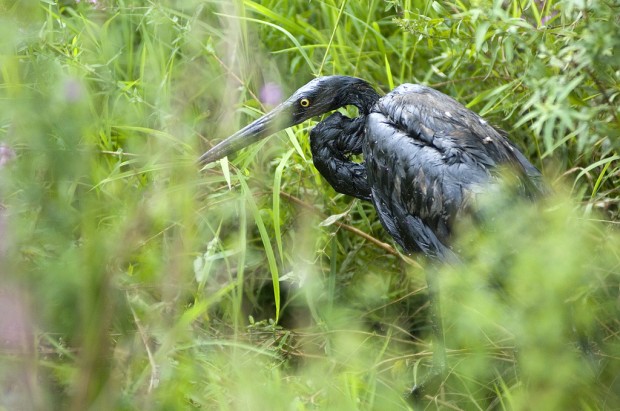We have much more to do and your continued support is needed now more than ever.
New Report: Tar Sands Oil Too Risky for the Great Lakes Region
A report issued by National Wildlife Federation, Minnesota Conservation Federation, and Prairie Rivers Network shows that industry plans to expand tar sands transport through the Great Lakes region pose too high a risk to the wildlife and communities of the region. Industry has plans to approximately triple tar sands transport through the region along a web of pipelines that threaten the region’s lakes, rivers, streams and other habitat areas inhabited by loons, wolves, moose and other wildlife.
The Great Lakes region has already experienced the negative impacts of tar sands when, in 2010, a pipeline burst in Marshall, Michigan, sending about a million gallons into the Kalamazoo River. Thousands of animals died and portions of forty miles of the river are still polluted.

Tar sands also harms wildlife because it fuels climate change. It is at least 17% more carbon intensive than convention oil on a life-cycle basis. Thus, it adds to the carbon pollution that is already causing harmful trends for wildlife and people. These include lower lake levels, more extreme storms, hotter temperatures, and toxic algal blooms that are plaguing the Great Lakes.
Tar sands is dirtier to refine. Refineries in the area that process tar sands are already seeing huge piles of a byproduct called petcoke pile up. This coal like substance is releasing toxic dust into nearby communities and waters, poisoning wildlife habitat and making it so that in some communities people are being forced to keep their windows shut because of the black dust.
The report makes the following recommendations:
-
Environmental Review: The State Department should conduct a thorough public environmental review of all proposed pipelines. The review process should account for all risks posed to the Great Lakes region and beyond from tar sands oil transport across the border.
-
Apply the Climate Test: President Obama should consistently apply his “climate test” to all tar sands oil pipelines. Pipelines that fail the test and significantly exacerbate the problem of carbon pollution should be rejected.
-
Utilize Existing Regulatory Authority: President Obama should direct his Administration to utilize existing regulatory authority to require the best technology and safest methods for transporting tar sands oil.
-
Updating Safety Regulations: The Administration must update old, industry-friendly pipeline safety and rail regulations that unnecessarily place wildlife and communities at risk.
-
Transition to Clean Energy: States in the Great Lakes region should put in place policies that will reduce reliance on dirty fossil fuels and speed the transition to clean, renewable sources of energy that protect both wildlife and people.
The report also asks the State Department to reverse the approval of an illegal backroom deal with pipeline company giant Enbridge to double the amount of tar sands flowing into the region. This approval involves a scheme involves temporarily diverting flows from Alberta Clipper to a neighboring line in an attempt to avoid public review of the impacts to the region. This scheme could possibly involve carbon emissions that are the equivalent of adding over 10 million cars on the road. Conservation and tribal groups are challenging the approval of this scheme.
The Great Lakes need an energy future that will ensure our children’s future is one that offers the beauty, wildlife and bounty of the amazing treasures of this region, not one of toxic waters and an unwelcoming climate.
 Tell the State Department: Do not allow expansion of the Alberta Clipper tar sands pipeline!
Tell the State Department: Do not allow expansion of the Alberta Clipper tar sands pipeline!






















